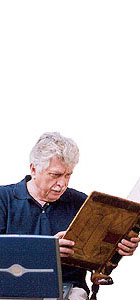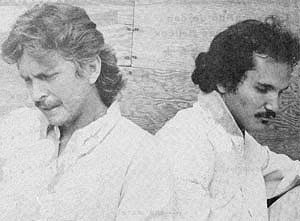
|
Play (Front Row Theater Company, 1985)As creator, the playwright tampers with the arbitrariness of destiny and choice, forcing his actors to perform a play which is being rewritten even as they act it. Characters change and double in on themselves and the whole piece becomes a living nightmare. Play explores the psyches of its actors on different levels: the actor as real person, the actor as actor, the actor acting as actor. There are many subtleties and surprises, and the element of chance and improvization challenges us and keeps us asking questions even though it is obvious there are no simple answers. KPIX Radio A mixture of Pirandello and The Actor’s Nightmare. What makes it absorbing is the highly naturalistic direction of the author and the lively acting of his cast. San Francisco Chronicle 
Playwrights Back to Back Play is not so much a play within a play as a play without a play. Let me think; do I mean that? Does that even mean anything? Perhaps it does, but if so, is it really apt? Or apt for Play? It seems a little clever. Perhaps too clever? Play is not so much a play within a play as a play outside a play. Does that mean anything? Or is that clever, too? Too clever? Play is... playful. I think anyone would agree with that. Although there was that one audience member who came up to me in the intermission. Oh, yes, I remember her. “Are you the playwright?” she said, tapping me on the shoulder. “Yes,” I said, turning to face her coy, comely face. “Oh!” she beamed. “I’ve always wanted to say this to a playwright!” And could anyone have beamed brighter? “Your play is a complete and utter waste of time.” I didn’t have a chance even to commit to an, “Oh,” before she turned and walked out of the theater, laughing out loud. I did not have esprit d’escalier for at least a full minute to call after her, “Well, your adjectives are redundant!” A friend who was with me and observed the interchange told me that the expression on my face was exactly that of Robert Redford in “The Natural” at the moment that he takes a bullet in the chest from the woman he has been wooing. So perhaps Play is not playful to all people. A friend of mine told me with a laugh and a shrug of his shoulders when I asked him—after he saw the performance— “When did you first know what was going on?” “I never knew what was going on!” My assistant director confided in me about midway through rehearsals, “I’m glad you seem to know what you’re doing. This is a play that you can’t read, you know; the script can’t convey it; this is a play you’ve got to see. And even then... ?” I think these comments must come from the fact that Play is indeed all three: not only a play within a play, but a play outside a play and—perhaps at least as apt—a play without a play. There is the play that the actors act, and the play that the actors are supposed to act, and then that other play, the play that the audience actually sees. What I mean is, there are these actors. And they are supposed to be performing a play. A play called Play. But then they can’t perform this Play and so they decide to perform this other play, a comedy called Performance. But as they are performing Performance, things happen, things that, yes, cause the audience to laugh but also to begin to shift uncomfortably in their seats, and the laughter turns nervous. Are the actors beginning to “go up”—as it is called when actors begin losing their lines, and losing their place in the play—or is the play beginning to be rewritten before our very eyes by some unseen playwright using devices of trickery and treachery? And just when is it that the audience gets the definite feeling that one hapless actor—FIRST ACTOR, as he is called in Play and GEOFFREY as he is called in Performance—begins to be “written out” of the play. He must die, of course. His throat must be cut open with a straight razor by one of the other actors, in a special pool of light, in full view of the hapless audience, who have not yet known at any given moment just what is going on on this stage. “He’s playing with us,” THE ACTRESS murmurs to herself as she feels something strange within, and she begins to catch on that the playwright is mixing into the play as it is being performed. And then, as the lights dim and the special pool of light comes up, THE ACTRESS says, “Oh! Look at the moon!” Of course what the playwright wants the audience to believe is that they are watching a play, so that they will sit quietly in their seats and not interfere with his murder. But the playwright is not so dumb that he does not know that inside the bosoms of the audience, there is the aching fear that indeed they may be watching an actual murder, only a few feet in front of their eyes, and is this a joke, or what? “Exquisite theatah, Bob! Exquisite. Never have I been so... challenged!” I never did hear those words, but I do believe that I did notice a few beads of nervous sweat when the lights did come up. Play. Fun. NOTE 2015: Interesting, what I've written just above about Performance and the names of the actors, FIRST ACTOR and THE ACTRESS, interestiing because I've just retyped the entire play from a paper script (couldn't find an electronic copy because it was three or four computers ago, and couldn't even find a 3X5 floppy) and the characters are named quite differently and the interior play is not titled Performance but THE AFFAIR. In 2004 when I put up this page, I suppose I was working only from memory, and I must have had the actual clippings of the reviews; but now they're lost in the files. The Front Row Theater Production, for which the reviews at top were written, may have been 1985 as it says up there. The title page of the paper script says copyright © 1984, rev. 1986.To read PLAY
Copyright © 2004 Robert Locke rev. 2015 |